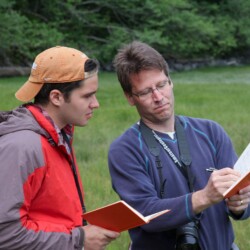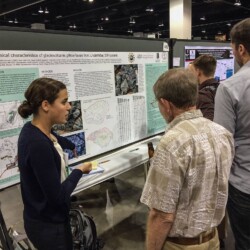Faculty Mentors/Research Advisors
If you agreed to serve as an on-campus FACULTY MENTOR/RESEARCH ADVISOR, you should have received a completed application from the student applicant and a copy of her/his transcript. The “Online Faculty Form” button on this page takes you to a Google Form where you will be asked to certify that you are willing to undertake the responsibilities of the on-campus mentor/research advisor (see below).
Note: We request Faculty Research Advisors of students applying to Advanced projects to provide the name(s) of potential faculty members from your institution who’s expertise more closely aligns with the applicant’s second or third choice project, especially if you are unable or unwilling to serve in this role if students get placed on a different project.
Expectations of Mentors Gateway Project Participants:
- Help student choose an appropriate project and prepare application materials
- Be a resource to the student as they prepare for the summer research experience (e.g., respond to questions about logistics, field equipment, expectations)
- Work with Project Director(s) after the summer project to help prepare student to attend a professional conference and to present or co-present their results
- Be a resource and advocate by providing general support and encouragement surrounding the research experience
Expectations of On-Campus Research Advisors/Mentors of Advanced Project Students:
- Work with the Project Director(s) to help define an appropriate research project for the student applicant that aligns with your interests and expertise. Project directors will contact you before the summer research begins to learn your interests and the type of equipment the student can access at your institution. If possible, you should meet with your student before the summer research project begins to discuss their summer work and the expectations for next academic year.
- Students on Keck projects are required to complete at least one term, block, or semester of independent study or thesis credit at their home institution. Your primary responsibility is to ensure that the student registers for this credit and to supervise this research based on the work done during the summer program.
- Working with the student throughout the following academic year might include regular meetings with the student, helping the student with scientific equipment at your institution, reading drafts of abstracts submitted to regional or national conferences, and reading drafts of their short contribution to the Proceedings of the Keck Geology Consortium published in the spring.
- Project Director(s) will be in regular contact with your student about deadlines and other project activities and will cc you on most, if not all of these conversations. The goal of these projects is to build a collaborative relationship between the Project Director(s), students, and On-Campus Research Advisors.
- We strongly encourage you to visit the summer project in order to facilitate selection of an appropriate student project, to improve understanding of the group’s research goals, and to establish good communication between the on-campus research advisor and the project staff. Limited funding is available for this visit; please contact Cam Davidson (cdavidso@carleton.edu) or Karl Wirth (wirth@macalester.edu) if you are interested.
- See below for more information on the nature and timing of student research projects.
Additional information on the nature and timing of Advanced research projects
Students make a yearlong commitment to the program, and the nature of their experience varies markedly through the year. In the spring before the field season, project directors lead the students through the background study needed for a basic understanding of the project and geology of the study area. Online interactions for each project facilitates communication among participants (project faculty, students, and on-campus research advisor). In the field phase, students spend four-weeks at the study site, learning geology in more detail, identifying a project, and gathering data.
Fieldwork varies with the project (see proposed project descriptions), but includes activities such as mapping, coring, surveying geomorphologic features, measuring stratigraphic sections, and sampling for later chemical or petrographic analyses. During the field season, the impetus of work transfers from the project faculty as students take responsibility for developing a research plan and collecting the data and samples needed to complete their work.
Following the field phase, students return to their home campus and work under the guidance of an on-campus faculty research advisor. During this time, work is more independent in nature as students work to finalize data collection and analysis (e.g., sample preparation for petrographic and chemical analyses, distillation of survey data, textural analysis) and interpret their results. Online interactions, however, facilitate communication among participants so that the collaborative aspect of the overall research project is maintained. Past experience shows that students have a better research experience in the independent-study phase when the on-campus research advisor travels to the field site. Site visits are especially critical for advisors new to the program and limited funds are available to support this travel.
Each student, with or without their faculty advisor, will be expected to participate in several virtual meetings with project faculty and the other students on the project. The timing and format of these virtual meetings will be determined by the Project Director.
The independent-study phase culminates with the publication of a short contribution (4-6 pages with figures) in the Proceedings of the Keck Geology Consortium (see the Publications tab on the Keck Geology Website for examples of past contributions). Most projects also have their students present their work at a regional or national conference paid for by the Consortium.
Important: Please note that Faculty Recommenders and Faculty Mentors/Advisors are not necessarily the same person.


